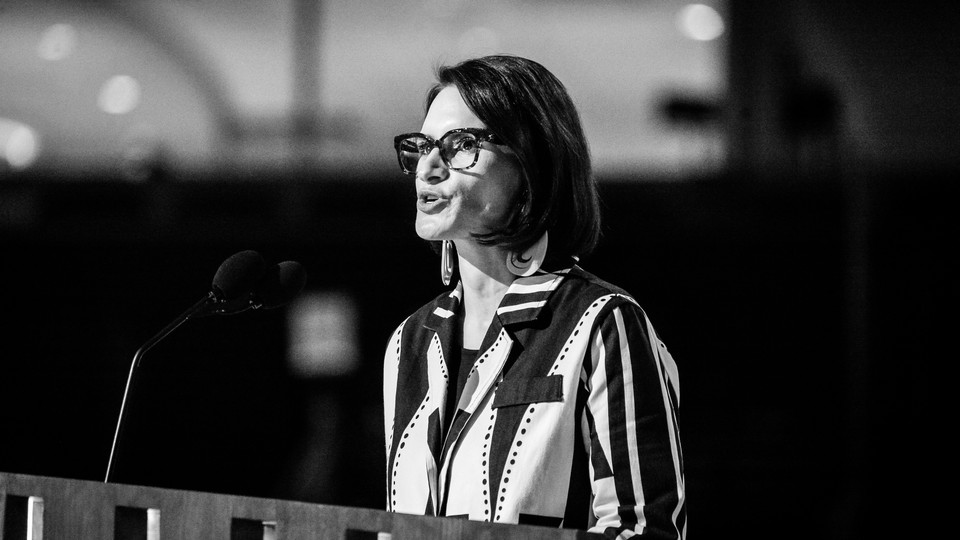Tim Walz’s Understudy Could Get a History-Making Promotion
4 min read
Peggy Flanagan is used to filling in for Tim Walz. As the lieutenant governor of Minnesota, serving as an understudy is most of the gig.
On Wednesday afternoon, that meant delivering the speech that Walz was originally supposed to give in Chicago on the third day of the Democratic National Convention—before President Joe Biden abandoned his campaign and set in motion events that upended the lives, and possibly the political futures, of both Walz and Flanagan.
Until his selection as Kamala Harris’s running mate, Walz had been scheduled to give remarks at a much smaller venue miles from the United Center stage, at an event held by the Center for American Progress Action Fund. Now that the governor had a more important address to deliver, Flanagan stepped in. “Our whole job is just ‘Be ready,’” she joked to an audience that numbered in the dozens. Being ready will take on added significance if Harris makes history as the first woman president, taking Walz to the White House along with her. The 44-year-old Flanagan would achieve a milestone of her own, becoming the first Native American woman to serve as governor of any state in the country.
A longtime activist and community organizer, Flanagan has none of the average-citizen-turned-politician vibes that Walz does. But the two share a folksy sense of humor. She’s a member of the Ojibwe tribe, which she noted was the “largest tribe in Minnesota and the best-looking tribe in Minnesota.” “My English name is Peggy Flanagan,” she told the audience. “My Ojibwe name is Speaks With a Loud and Clear Voice Woman.” A beat later, she added with a wide grin: “It’s okay, you can laugh.”
Though she’s 16 years younger than Walz, Flanagan got into politics first. Fresh out of college, she was a volunteer on Senator Paul Wellstone’s 2002 reelection campaign, which ended tragically when the two-term Democrat died in a plane crash 10 days before the election. Wellstone’s family and former colleagues created what became known as Camp Wellstone, a training program for aspiring politicians and advocates. Walz showed up in 2005, an Army veteran and public-school teacher trying to flip a Republican House seat in his first political campaign. “He was my camper. I taught him everything he knows!” Flanagan said.
Flanagan served for four years in the state legislature before she and Walz formed a statewide ticket ahead of the 2018 governor’s race. (They won reelection in 2022.) Throughout this week’s convention she’s been promoting their record in Minnesota, which includes the passage of laws guaranteeing access to abortion and IVF, paid family leave, an expanded child tax credit, and free breakfast and lunch in public schools across the state. Democrats have taken to calling that list “the Minnesota miracle,” a feat they hope to recreate nationally.
As Flanagan noted in her speech, Democrats in Minnesota enacted the bulk of their agenda with just a one-seat majority in the state Senate—which is likely the most that Democrats could have next year in Washington. “Much of what we’ve been fighting for the past 20 years has come true,” she said. “In Minnesota we like to consider ourselves humble people, but today we’re going to brag.”
Republicans have assailed Walz’s Minnesota record as extreme, criticizing him for policies that offer benefits to undocumented immigrants and accusing him of signing a law that required public schools to stock tampons in boys’ bathrooms (a claim that has been debunked). They’ve also accused him of exaggerating parts of his biography, including his military service. Flanagan didn’t address the most inflammatory of the GOP’s charges, sticking to the more broadly popular elements of the policies she and Walz enacted in Minnesota.
Like Walz, Flanagan has a fiery side as well. She devoted much of her remarks to rebutting the perception that Walz and the policies he enacted—and which Harris is running on—are too progressive. “Access to basic resources like housing and food isn’t radical. It’s rational,” Flanagan said. “Demanding control over our own body isn’t extreme. It is the bare fucking minimum of what we should expect,” she added, drawing gasps and whoops from the crowd.
I caught up with Flanagan after the speech. She said her and Walz’s tenure showed that he was “an incredible partner for women in leadership.” “People could see themselves reflected in our ticket,” Flanagan said, “and I see that happening now with Kamala Harris and Tim Walz. Different lived experiences, but shared values.”
She was wearing tribal earrings, and eight of her fingernails were painted hot pink. The other two were bright green. “I decided to do one chartreuse nail for brat summer,” she told me, “and the rest are pink because I figured I couldn’t get away with all green nails as lieutenant governor of Minnesota.” Maybe she could have gotten away with it a few weeks ago, when Flanagan was as anonymous as any other political understudy from a midsize state. Now excited Democrats around Chicago treat her, perhaps presumptuously, as the governor-in-waiting.
Flanagan told me that she learned about Walz’s selection at the same time as everyone else. But her phone rang almost immediately after the announcement was made: “Buckle up,” Walz told her. “We’ve got a lot of work to do.”



